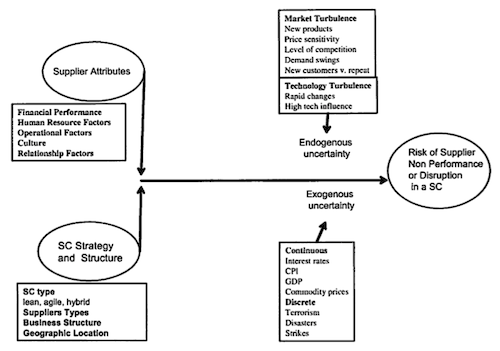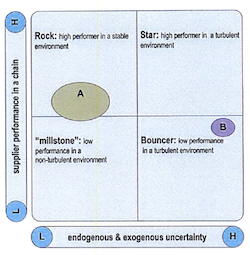Supplier Selection in a Turbulent World
At the moment I am focussing more on the interviews I am conducting for my research, so I am not reading as much anymore. I therefore try to select articles which are both useful for my research and my blog.
Today I read an article with the fuzzy title “Supply chain risk in turbulent environments — A conceptual model for managing supply chain network risk” by Peter Trkman and Kevin McCormack.
The authors present a framework for the identification and prediction of supply risk.

Risk and Turbulence
The authors define risk as an adverse event with a given likelihood and outcome. They further distinguish the source of risks similar to Christopher and Peck (2004) depending on the origin of the risk: a) Endogenous uncertainty (from within the Supply Chain) and b) Exogenous uncertainty (discrete events and continuous risks). Turbulence is not defined per se but turbulent conditions are defined by …
… frequent and unpredictable market and/or technological changes with in an industry which accentuate risk and create an inability to forecast accurately.
Major drivers of turbulence are market and technological turbulence.
Prediction of supplier risk

- strategic (eg. quality)
- tactical (eg. order cycle time) and
- operational (eg. number of complaints).
These indicators then form the basis for a decision on the supplier portfolio. To support this process the authors also developed a supplier performance and uncertainty matrix.
Conclusion
I liked the idea of the article: How can you best identify and assess/predict risks in the supply chain? This is one of the most important questions in Supply Chain Risk Management. But I think the implementation leaves more holes than it needs to.
The Pros:
- The authors are conceptualizing a more holistic approach to assess supplier risk
- They also give hints on how to this process can be supported (by the matrix for supplier selection)
I would have loved to see more detail on many of the points mentioned, so I would think twice before using the framework without modification.
- Fuzzy wording
The title promised new research on supply chain risk in turbulent environments, but the article was only about the supplier selection process. Until chapter three it was not made clear that the authors are only talking about supplier risk (before it was still called supply risk). And there is no explanation on why they used risk and uncertainty interchangeably
- Definitions
I did not find a definition for turbulence or any other term beside “risk” (see above)
- Framework
Due to the fact that the framework is conceptual I would have loved to see more arguments on why the selected factors have been chosen and why the framework is complete.
- Matrix
Even though I like this way of thinking about the supplier selection, the matrix is flawed since the axis are not independent (performance usually is contingent on the turbulence around, but I have to admit that’s the same for the Growth-Share-Matrix as well)
- Prediction
The authors talk about predicting the risk of suppliers, but do not give any (conceptual) hint on how to do this with the given framework.
I hope this review was helpful for you! If you have any comments, questions or suggestions you can use the comment section below or contact me directly.
Trkman, P., & McCormack, K. (2009). Supply chain risk in turbulent environments—A conceptual model for managing supply chain network risk International Journal of Production Economics, 119 (2), 247-258 DOI: 10.1016/j.ijpe.2009.03.002








Comments
Wonderful comments about the paper moreover you commented about the supplier selection matrix which are not independent can you please advice which type of matrix to consider!!
Hi,
there is definitely no one-fits-all-matrix. The selection of a specific matrix should always be contingent on the selection criteria you have for your suppliers.
Have a look at this supplier selection process with a focus on sustainability risk: Supplier selection with sustainability risk
If you want to discuss this topic further please contact me directly.
Daniel
Hi Daniel
can you suggest a paper which talks about multi mitigation approaches for supply chain disruptions..
Add new comment